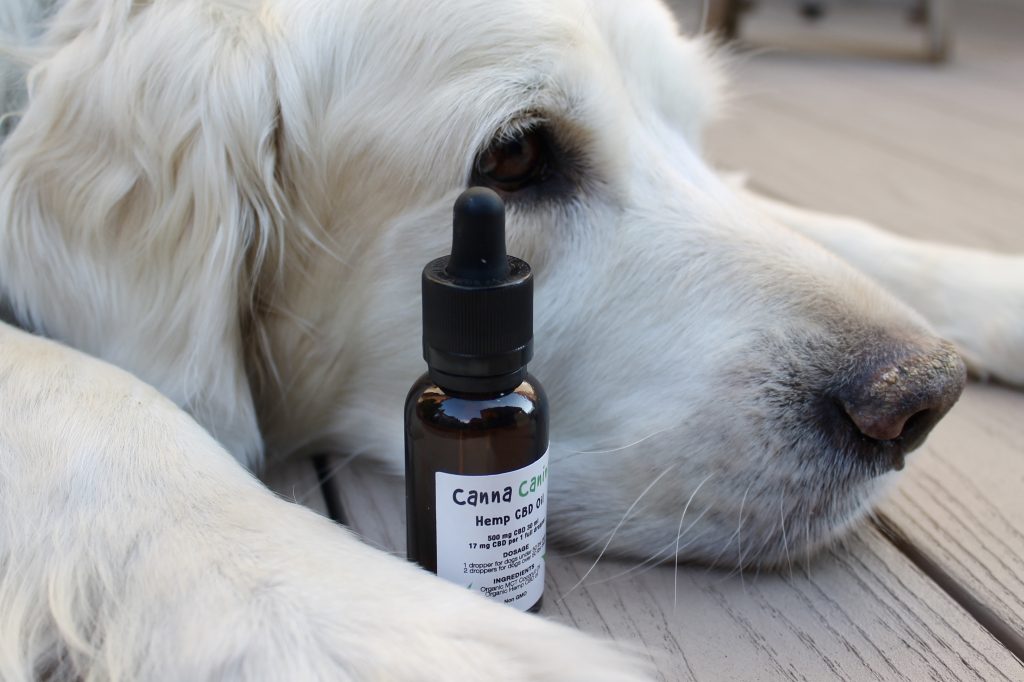BY MEGAN D’ANDREIS
While most are talking about the health benefits of cannabis for humans today, what about man’s best friend?
Most people do not associate cannabis with their pets, however, a growing trend in pet wellness is the use of CBD (cannabidiol) products for dogs.
Although cannabidiol comes from the cannabis family, it does not result in “high-like” symptoms that someone receives when they smoke a joint, which come from the psychoactive compound THC (tetrahydrocannabinol).
According to the Ministry of Hemp, hemp plants have a maximum level of 0.3% THC and higher levels of CBD. Compared to marijuana, which has 0.5%-20% THC on average, and lesser levels of CBD. Hemps high CBD content which acts as THCs competitor, making the minimal amount of THC useless. Hemp may offer a range of medical benefits, without the cognitive effects associated with THC.
In other words, your dog will not get high from CBD. People have reportedly claimed that CBD can improve your dog’s health, in number areas including:
- Seizures
- Nausea
- Stress
- Anxiety
- Arthritis
- Back pain
- Gastrointestinal issues
Dr. Sarah Silcox, president, and director of the Canadian Association of Veterinary Cannabinoid Medicine says that because CBD has been reported to aid in a wide range of conditions in humans, she anticipates that it would have a similar effect in most animals as well.

Dr. Silcox explains that the only published paper to date examining CBD and its effects on dogs is for the use of osteoarthritis, a joint disease that causes pain and stiffness.
However, most of the information provided on the topic is based on anecdotal evidence, meaning that people are sharing their experiences without scientific evidence. Dr. Silcox says there are studies underway examining its effect on epilepsy, pain, and anxiety for dogs as well as other animals.
Dr. Silcox has seen her own patients improve with CBD. Some patients are struggling with various conditions for months, or sometimes years, and within days of starting CBD see a dramatic improvement.
Pet owners who are contemplating CBD may wonder what the correct dosage is for their dog. Due to the limited studies available at this time, dosage is also based on anecdotal evidence depending on the dog’s weight and condition.
The golden rule of cannabis therapy, “start low, go slow” applies to animals as well, Dr. Silcox explains.
Though veterinarians are currently unable to prescribe or authorize the use of CBD, Dr. Silcox says that in the coming years, as new drugs containing cannabis are developed and approved by Health Canada as pharmaceutical drugs, veterinarians will be able to prescribe, dispense, and administer these products. These products will contain a Drug Identification Number (DIN) and will be treated like any other prescription medication.
“We need to ensure that we are providing our clients with the education that they need, to reduce the risks to our patients and ensure that cannabis products that the pet family chooses to use are as safe as possible,” says Dr.Silcox.
CannaCanine is a Canadian company that specializes in hemp CBD products for dogs. Marc Benevenga, founder of CannaCanine found a need for this product when his Jack Russell, Lyla, was experiencing health issues
“We were at the point where we thought we had to put her down. She was facing issues that come with old age. She couldn’t go up the stairs and she wasn’t eating. I saw these treats made out of CBD oil that advocates all these health benefits. I bought an oil and started to give it to her in a treat form, and in two weeks she did a complete 180,” he explains.
Benevenga says that before considering a quick solution, people need to look at all of the factors when becoming aware that something is off with their pet. If they have anxiety, we should think about what is causing the anxiety before treating the situation with something like CBD, he explains.
It is important to ensure your dog is properly exercised, trained and has proper nutrition, before you introduce them to CBD, according to Benevenga. He explains that CBD infused treats are an ideal way to ease your dog onto the products as it is much less concentrated than the oil.
“At the end of the day, CBD is a tool in the toolbox,” he says.
Dr. Chip Coombs (BSc), Chief Veterinary Officer at Pets Plus Us, is a believer in evidence-based medicine.
Dr. Coombs emphasizes the importance of being pragmatic and says if you are going to say something works, then it should truly be based on science and not anecdotal evidence.
“What I am worried about is people hoping that these products are going to help their pets.”
Dr. Coombs explains that one has to be really cautious when interpreting anecdotal evidence, given to you by owners. He shows concern that owners experiences with CBD may be driven by the fact that they want it to work. This is known as caregiver effect, quite similar to the placebo effect.
At this time, CBD is still considered a “grey area” because there is arguably not enough scientific research behind it. Based on human science, Dr. Coombs does believe there are possibilities and with legalization in place, it is expected that more studies surface over time.
Whether you intend to use CBD products for your pet or not, understanding the difference between hemp and marijuana is essential. Dr. Coombs is concerned that with the legalization in place, we are going to see more toxicities in our pets because they may often be ingesting marijuana when their owner leaves it around (containing THC).
Both Dr. Silcox and Dr. Coombs are concerned about the quality control in products that are available.
Dr. Silcox says that because these products are not compliant with the current legislation, they also are under no type of regulation.
“This means that we really have no way to ensure that they are being manufactured under proper conditions and that they are putting in the package what they claim on the label,” she says.
Because these products do not yet have a DIN, they are limited as to what they can claim for medical efficacy. As supplements, they allude to medical claims, enough to get around the law, and enough to give pet owners the feeling that it can help their pet, Dr. Coombs explains.
Dr. Silcox says that CBD could have a negative interaction with other medications your dog is taking.
She explains that CBD shares a metabolic pathway with many other commonly used drugs, posing a concern for patients receiving other medications.
“While we haven’t clearly identified any significant risks in dogs at this time, the potential for interactions raises the need for further studies in this area.”

